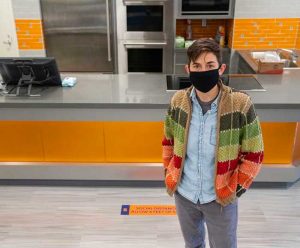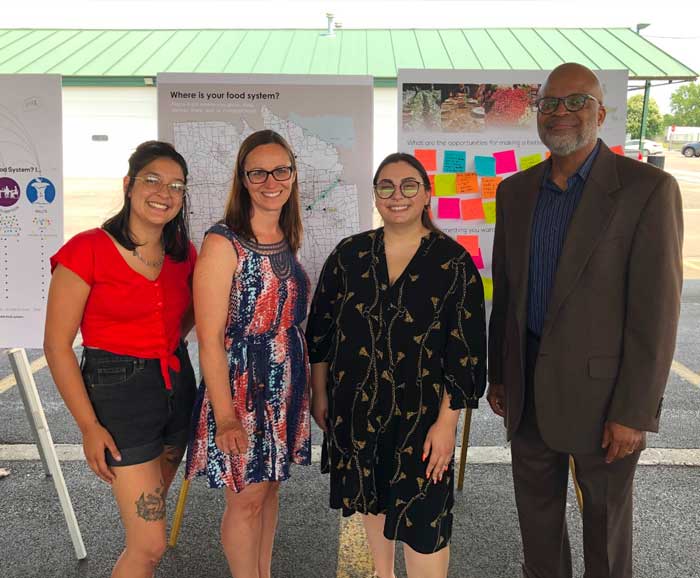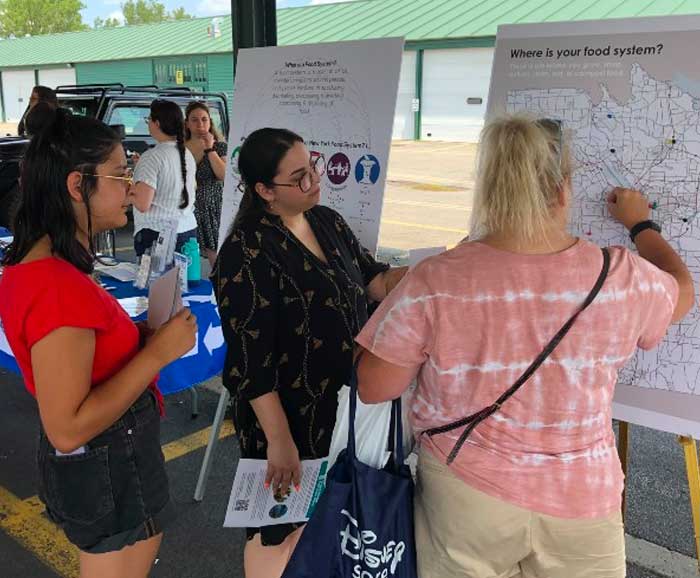
Nel Gaudé, who was completing a master’s in food studies from Falk College, was working in the kitchens at Falk in March 2020 when the COVID-19 pandemic hit. Weissman, an associate professor of food studies and nutrition in Falk, started looking for ways for Gaudé and other students who lost their jobs to make extra money.
At the same time, Weissman was in conversations with the Lender Center for Social Justice at Syracuse University to create a 2020-22 Lender Center for Social Justice Fellowship for students who would help organizations such as SOFSA determine how food systems in Syracuse could better meet the needs of the community.
So Weissman introduced Gaudé to Maura Ackerman, SOFSA’s facilitator, and they discussed a summer internship for Gaudé, who would support SOFSA activities and build a bridge to the work that would be done by students during their two-year fellowship.
That conversation was the last time Gaudé and Ackerman would see Weissman, who died unexpectedly in April 2020.
“He remains the connective tissue,” Ackerman says. “Going through the process of grieving and mourning Evan’s loss really galvanized all of the folks involved in SOFSA to continue this work as part of his legacy.”
Jonnell Robinson, Weissman’s close friend and an associate professor of geography and the environment in the Maxwell School of Citizenship and Public Affairs, was selected by the Lender Center to replace Weissman as the 2020-22 Lender Center Faculty Fellow. Following the lead of her friend, Robinson asked the Lender Center for a grant that would pay Gaudé a stipend for their work with SOFSA last summer, and the Lender Center graciously agreed.
“The last time I met with Evan was the first time that I met with Maura, and he connected us and that was the last time I saw him before he passed,” Gaudé says. “Jonnell and Maura, both knowing Evan better than I, knew his concern for his students and his dedication to supporting us, not just in the classroom but in life.”
Last summer and into the fall, Gaudé laid the groundwork for the creation of SOFSA bylaws that were passed in June and will serve as a “guiding document for the organization,” Robinson says.
“So many organizations right now are doing a lot of reflection and trying to undo some of those systems of inequality that have built up,” Robinson says. “This did present us a unique opportunity to think about these issues on the front end and build an organization that was paying attention to this kind of thing right out of the gate.
“This is what Evan had laid out and was really interested to see happen,” Robinson says. “His major vision was that we didn’t just develop a food policy council, but that we developed a food policy council that was rooted in social justice and equality.”
Giving a Microphone to Those With Food Insecurity
With Weissman as one of its founding members, SOFSA was formed in early 2019 and the organization developed this mission statement:
Our mission is to strengthen our food system so that it works for all people in Syracuse and Onondaga County. We bring communities together to foster relationships, develop projects, align resources, and advocate for policies to improve the health of our neighbors and our environment.
But how to get there? That’s where Gaudé–and the Lender Center student fellows–played prominent roles. Gaudé spent several months researching and reviewing bylaws of other food policy councils and looked more broadly at the idea of creating an accompanying document that would outline the organization’s justice and equity principles.
“Nel took on, with gusto, a national scan of what food policy councils use for their bylaws and led us through developing bylaws that were adapted for our local context,” Ackerman says. “We named a committee that worked through the process to make sure that our bylaws fit our ways of operating and our culture and how best to include what we want for our community.”
Gaudé, who points out that it required “many minds, eyes and hearts” to create the bylaws, says the committee’s main goal was to ensure that SOFSA was following its mission and giving voices to the experiences of people who are marginalized throughout the food system.
“People who have lived with food insecurity or are daily victims of racial discrimination, these people know this situation better than anyone else and that wisdom needs to be acknowledged,” Gaudé says. “They need to have the microphone. They need to be telling us what they need and it’s our job to try to do what we can to support them.”
Led by SOFSA project coordinator Steve Ali, SOFSA created a diversity, equity, inclusion and accountability committee that includes Lender Center Fellows Avalon Gupta VerWiebe and Nicky Kim ’24. VerWiebe and Kim helped create an equity and justice statement that’s included in Article II of the bylaws.
“I think that there was a lot of momentum last year to have conversations about this and creating an organization like SOFSA from the ground up that is designed to be a community-wide initiative gave us a perfect opportunity to incorporate anti-racist activities from the very beginning,” says VerWiebe, a second-year food studies master’s candidate in the Falk College. “This opportunity to bring together Native American, Black, white, Latine, rural and city populations in one space to talk about how to affect change in the food system is extremely special and exciting to me.”

Fellows Carry on Weissman’s Vision
The next step for all the stakeholders is to put the vision of the bylaws into practice.
This past April, the six Lender Center Fellows, Robinson, the SOFSA board members and representatives from 15 food system organizations in Onondaga County participated in a training hosted by Soul Fire Farm. Soul Fire, according to its website, is “an Afro-Indigenous centered community farm committed to uprooting racism and seeding sovereignty in the food system.”
The training, Robinson says, helped SOFSA and the food system organizations understand where they stand in terms of engaging in anti-racist activities and that helped set the agenda for the new diversity, equity, inclusion and accountability committee.
“What does the history of inequality in the food system look like?” Robinson asks. “The Soul Fire Farm training did an amazing historical overview to show that there are deep chasms in equality. How, as an organization, do we change that course?”
To that end, the Lender Center Fellows have been participating in new SOFSA initiatives such as the “Chop, Chat, Chill” event that creates a welcoming space to people of color and others who have been excluded from various food planning initiatives; and a Political Coffee Hour event that enabled those from across the food system to meet with local policymakers.

On July 14, VerWiebe and Lender Center Fellow Taylor Krzeminski, a second-year graduate student, joined Robinson at the launch event for FoodPlanCNY, an initiative imagined by Weissman and Matt Potteiger to improve the health of residents through access to healthier food (Potteiger is a landscape architecture professor at the SUNY College of Environmental Science and Forestry). VerWiebe and Krzeminski led activities asking visitors for their thoughts on how to improve the local food system.
“We’re with the Lender Center for Social Justice, so for us fellows working with SOFSA it’s a wonderful opportunity to engage with an organization in the community that’s trying to establish itself as a social justice-based organization,” VerWiebe says. “SOFSA down the line won’t just be about policy, it’ll be about creating and transforming our community and creating spaces for change, accountability and justice.”
In addition to their work on the bylaws and with the diversity, equity, inclusion and accountability committee, the Lender Center Fellows are supporting SOFSA’s efforts to develop relationships with marginalized communities and learn more about their food stories so SOFSA can focus on projects that acknowledge the communities’ struggles and elevate their causes.
“There’s a particular energy that comes with the framing of this Lender project that Evan left us,” Ackerman says. “That’s his legacy that Jonnell is really committed to–and that the Lender (students) are just incredible advocates for—and they really seem to embody that energy, that vision and the drive to do this life-changing work.”
A Syracuse University News story by Matt Michael originally published on Friday, July 23, 2021.
